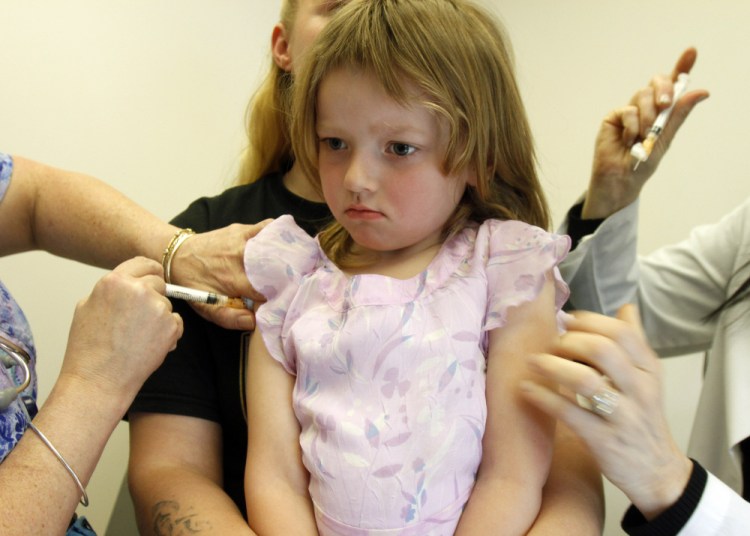Maine received welcome news this week on the public health front: Up to 400 more grade school children got the measles vaccine this school year than last, substantially improving the level of protection against an outbreak of the infectious disease. But it’s still far too easy for Maine parents to choose not to have their children immunized. And as voluntary opt-out rates remain among the highest in the nation, the chances grow that diseases will afflict people who can’t be vaccinated for medical reasons.
The only thing Maine parents have to do to get a non-medical exemption is check a box on a form, then sign it and turn it in, and our immunization coverage reflects this fact. While the national median opt-out rate is about 2 percent or less, the rate of Maine kindergartners whose parents chose not to vaccinate reached a dismal 5.2 percent in the 2013-14 school year – the fifth worst in the country.
The situation has improved since then, with state records showing the voluntary opt-out rate falling to 3.9 percent in 2014-15 and then to 3.7 percent in 2015-16. Vaccine coverage improved not only for measles, mumps and rubella but also for chickenpox, polio and whooping cough.
What’s made the difference? Efforts by individual schools have played a part. So have a state public education campaign and reminders to schools about the importance of turning in the required forms. Another factor is a public database, compiled by the Portland Press Herald, that allows parents, teachers and school officials to see how their school stacks up.
But there’s a lot of room for improvement. Vaccines are the most effective when everyone is immunized. Herd immunity – which protects the elderly, cancer patients, pregnant women and babies too young to be vaccinated – grows along with vaccination rates.
What’s more, the opt-out percentage is only an average. Some Maine schools reported immunization coverage of close to 100 percent. But 40 elementary schools with at least 15 students in kindergarten or first grade reported that 10 percent or more of their student population was forgoing vaccines, driving up the risk of an infectious disease outbreak in those schools – not to mention the surrounding communities.
We’re crossing our fingers for the success of renewed efforts to make it tougher for Maine parents to forgo vaccinations. A 2015 bill would have required parents to consult with a medical professional before being allowed to opt out on philosophical grounds; it received strong majorities in the Maine House and Senate before dying on a veto by Gov. LePage. Ensuring lasting improvement may be just as easy as that – if families have to go to the doctor anyway, then many may go ahead and have their children immunized.
We can’t let this small victory distract from the need to keep pressing for stricter school immunization requirements – the health of the community depends on it. State agencies have stepped up. So have Maine schools and medical professionals. Now it’s time for legislators to do their part.
Send questions/comments to the editors.



